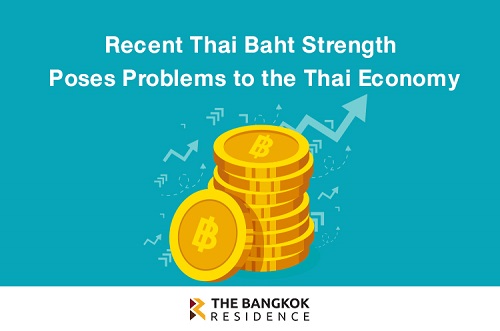Recent Thai Baht Strength Poses Problems to the Thai Economy

Recent Thai Baht Strength Poses Problems to the Thai Economy
In 2019, Thailand's currency increased rapidly against the dollar, reaching an 8% increase. The Baht has increased significantly in comparison to other market currencies. While a strong currency may reflect the country’s resilience and economy, the strong Baht sparks concerns within the Thai economy, as it weakens exports and lowers the attractiveness and amount of foreign investments. The cut in export of goods has a significant impact to the Thai economy, as it is one of the major sources of income for the country. As exports decline and foreign investors become scarce, the slight positive side to the stronger currency is that people are inclined to spend more by doing currency exchanges to travel abroad. In addition, people are encouraged to purchase imported products due to its cheaper prices, enabling consumers to enjoy more while leaving more room for spending. Nevertheless, this aspect would hurt the domestic demand of goods. Since 2019, the strong baht has concerned many industries, such as real estate that rely on foreign consumers and investors.
The Bank of Thailand has been implementing policies and taking actions in attempt to curb the Baht. Several trends had shown some signs of success, but its strength is still likely to be maintained throughout the remaining 2020. Lower foreign and domestic demand is causing the relatively stable Thai economy to decelerate in 2020. However, this is a very normal situation, considering the declining global economy.
Within the past few months, the rise against the dollar has been one of the steepest amongst Asian countries. The deputy governor Mathee Supapongse stated that “The Thai central bank is ready to take necessary steps to ensure Baht strength does not aggravate the fragility of the economy.” The country relies heavily on tourism, imports and exports, and trade, which have all been impacted by the Covid-19 pandemic. The Thai economy is currently relatively "fragile," and the global outbreak has impacted many sectors; however, the nation’s "success" in containing the virus may have partly been the reason for the Baht's appreciation. Impacts of the viral outbreak will be clearer as time goes on, and when economic numbers are released. In April, the Bank of Thailand announced that the economy will be going into a recession in 2020, by over 5%. Inbound travel restrictions have reduced all foreign tourists by almost 100%.
Lockdown restrictions have been eased significantly within the nation, but due to inbound travel restrictions tourism is still struggling to recover. It is well-known that Thailand relies heavily on domestic tourism, as well as from groups of people hoping to stay longer in Thailand with the Special Tourist Visa. As the central bank changes the scopes of their policies to curb the baht's appreciation, we are hoping to see some gradual changes in the trend, making it more attractive compared to other currencies of other emerging markets. Government measures will probably be put, in order to reform and control the potential risks both short-term, as well as long-term.











